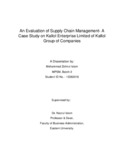| dc.contributor.advisor | Islam, Nazrul | |
| dc.contributor.author | Islam, Mohammad Zohirul | |
| dc.date.accessioned | 2015-08-24T09:17:55Z | |
| dc.date.available | 2015-08-24T09:17:55Z | |
| dc.date.copyright | 2014 | |
| dc.date.issued | 2014-12 | |
| dc.identifier.other | ID 13382016 | |
| dc.identifier.uri | http://hdl.handle.net/10361/4275 | |
| dc.description | This dissertation is submitted in partial fulfillment of the requirements for the degree of Masters in Procurement and Supply Management, 2014. | en_US |
| dc.description | Cataloged from PDF version of thesis report. | |
| dc.description | Includes bibliographical references (page 57). | |
| dc.description.abstract | The Supply Chain is not a business function, it is a network of companies and Supply Chain Management
is the implementation of cross-functional relationships with key customers and suppliers in that network. It
is a new business model necessary for an organization's success and every function needs to be
involved. Management must recognize that the ultimate success of an organization depends on the ability
to integrate the company's network of business relationships in a mutually beneficial way. The
management of this network of relationships is supply chain management. Successful supply chain
management requires cross-functional integration within the firm and across the network of firms that
comprise the supply chain. It is focused on the improvements in performance that result from better
management of key relationships. By understanding the supply chain management processes and how
they should be implemented, management will better understand the value of more integrated supply
chains and how this integration will lead to increased shareholder value and a sustainable competitive
advantage.
Entire network of entities, directly or indirectly interlinked and interdependent in serving the same
consumer or customer. It comprises of vendors that supply raw material, producers who convert the
material into products, warehouses that store, distribution centers that deliver to the retailers, and retailers
who bring the product to the ultimate user. Supply chains underlie value-chains because, without them,
no producer has the ability to give customers what they want, when and where they want, at the price
they want. Producers compete with each other only through their supply chains, and no degree of
improvement at the producer's end can make up for the deficiencies in a supply chain which reduce the
producer's ability to compete.
Objective of this thesis is to evaluate supply chain management of Kallol Enterprise Limited. Is Kallol
maintaining the process and procedures of SCM to go to its goal or to achieve its business objective? If
so how? If not, why? What will be suggestions for maintenance of SCM? The focus in the thesis is only
on KEL in the Supply chain. This company is managing its Supply chain based on what is best for their
own. Collaboration with other companies in the Supply chain will present win-win situations for this
company and for other companies in the Supply chain. | en_US |
| dc.description.statementofresponsibility | Mohammad Zohirul Islam | |
| dc.format.extent | 57 pages | |
| dc.language.iso | en | en_US |
| dc.publisher | BRAC University | en_US |
| dc.rights | BRAC University dissertation are protected by copyright. They may be viewed from this source for any purpose, but reproduction or distribution in any format is prohibited without written permission. | |
| dc.subject | Procurement and supply management | en_US |
| dc.subject | Supply chain management | en_US |
| dc.subject | Kallol enterprise | en_US |
| dc.subject | Logistics management | en_US |
| dc.subject | Procurement policy | en_US |
| dc.title | Evaluation of supply chain management: a case study on Kallol Enterprise Limited of Kallol Group of Companies | en_US |
| dc.type | Dissertation | en_US |
| dc.contributor.department | BRAC Institute of Governance and Development, BRAC University | |
| dc.description.degree | M. Procurement and Supply Management | |

